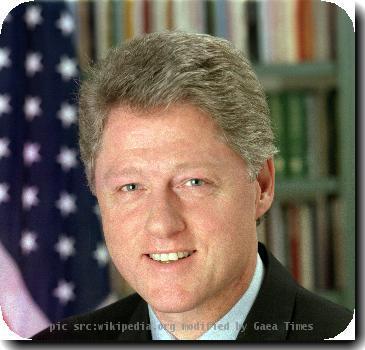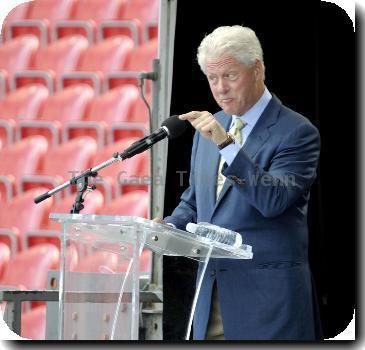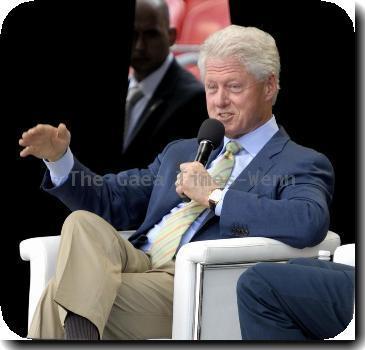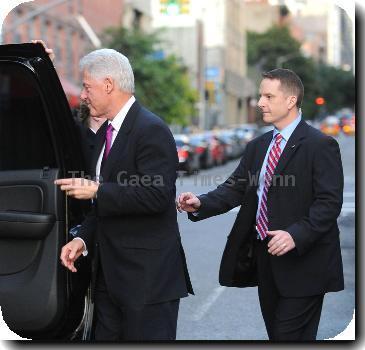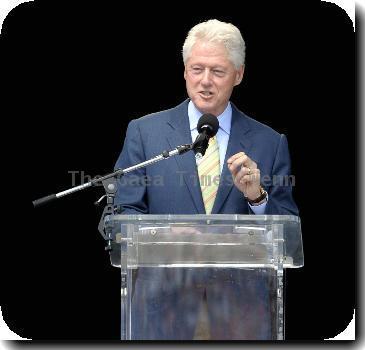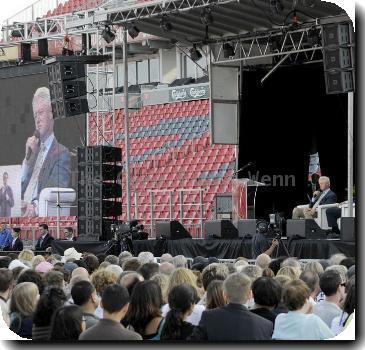North Korea says it will allow more American tourists this year, after heavy restrictions
By Cara Anna, APWednesday, January 13, 2010
North Korea says it will allow more US tourists
BEIJING — North Korea said Wednesday it will begin to allow in more American tourists after years of heavy restrictions on visits to the isolate country, according a tour operator.
The United States has never had diplomatic relations with North Korea since the Korean War ended in a truce, not a peace treaty. More recently, tensions have remained high over the North’s nuclear program.
Only about 2,000 tourists from the U.S. have visited since the country opened to Western tourism in 1987, according to the founder of a China-based tour group that says it has taken most of those visitors into the isolated country.
But the Koryo Group, which specializes in North Korea tourism, said it received an e-mail from the state-run Korea International Travel Company on Wednesday afternoon saying the country will accept more American tourists this year.
The message gave no explanation for the move and said more specific information would come later, the agency’s founder, Nicholas Bonner, told The Associated Press.
“This is a big, big change,” he said.
Tensions with the outside have risen in recent years over the North’s pursuit of nuclear weapons, with Pyongyang saying this week it would not resume negotiations aimed at ending such programs until its relations with the U.S. improve and international sanctions against it are lifted. The U.S. rejected the proposal.
In recent years, Americans have been allowed to visit North Korea only briefly during the country’s Mass Games, a synchronized propaganda spectacle with a cast of 100,000.
Bonner said his Beijing-based agency escorted about 280 American tourists to the country last year, but estimated those numbers could jump to about 1,000 per year if restrictions were eased. He said his agency handles about 90 percent of the Americans visiting North Korea.
North Korea is governed by a secretive, hardline communist regime whose motivations and decision making processes remain obscure. But one analyst said Pyongyang’s move appeared aimed at improving the North’s image among Americans as part of its ultimate goal of establishing diplomatic ties with Washington.
“The North wants to project a positive image toward Americans by increasing contacts,” said Paik Hak-soon, an analyst at the Sejong Institute, a private security think tank near Seoul.
Once a key symbol of reconciliation between the divided Koreas, tourism from South Korea has been cut off for two years due to tensions on the peninsula.
South Korea pulled the plug on tours to the North’s scenic Diamond Mountain resort in July 2008 after a South Korean woman on a tour was shot and killed there. North Korea, meanwhile, ended another South Korean tour program to historic sites in the North Korean border city of Kaesong in late 2008 amid rising tensions.
At one time, up to 300 Japanese citizens also visited the North each year, while North Koreans living in Japan could take a ferry to visit relatives. Those services have been suspended since 2006 as part of Tokyo’s sanctions against Pyongyang over its missile and nuclear tests.
The U.S. State Department has no travel warning for North Korea. But three Americans have recently been detained for allegedly crossing illegally into the North from China.
The U.S. State Department has no travel warning for North Korea.
“If we don’t have a presence in a country, then obviously it’s difficult for us to respond if Americans get into trouble,” said Susan Stevenson, a spokeswoman for the U.S. Embassy in Beijing. “But we do work through the Swedish Embassy there, so there are ways the U.S. can still find out what’s going on. That’s the general caution.”
Bonner said his Beijing-based tour group has taken in more than 90 percent of the U.S. tourists to North Korea in the past eight years, and he said it took about 280 Americans last year for the Mass Games.
North Korea remains a highly controlled society, but Bonner estimated that the number of Americans visiting North Korea likely would jump to close to 1,000 a year under the new relaxed restrictions.
Three Americans have recently been detained for allegedly crossing illegally into the North from China.
In August, North Korea freed two U.S. journalists arrested in March whom it had sentenced to 12 years of hard labor for trespassing and engaging in “hostile acts.” The women were released to former U.S. President Bill Clinton, who went to Pyongyang to negotiate their freedom.
On Christmas Day, a Korean-American missionary named Robert Park walked into the country carrying a Bible, intent on preaching Christianity. Park has not been heard from since, though North Korea later announced that an American was in custody, without identifying the person.
Tags: Asia, Beijing, Bill Clinton, China, East Asia, Embassies, Greater China, International Agreements, Leisure Travel, North America, North Korea, Pyongyang, South Korea, United States
